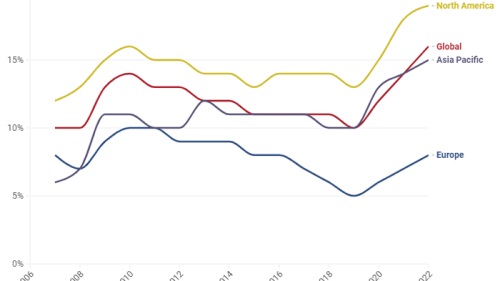Multifamily property managers in the United States are developing a new playbook to deal with the COVID-19 crisis.
The primary focus for apartment owners and managers is making sure their residents and employees are safe. At the same time, the industry is very much in the customer service business. So, part of the task at hand is figuring out how to “normalize” everyday activities during the current crisis, notes Bob Gleason, vice president of asset management at Chicago-based Albion, which owns 3,000 units in the Midwest.
Please join ULI for a timely webinar titled Confronting COVID-19 in Multifamily Housing on April 7.
Foremost, property owners across the country are following CDC recommendations in areas such as cleaning and disinfecting and social distancing, which has resulted in more limited face-to-face contact with residents and closing of amenities such as pools, fitness facilities, and meeting rooms. Owners also are working to reduce traffic at properties by halting on-site prospect tours and delaying nonessential maintenance and improvement projects.
“Our challenge as property owners and managers is to do what we can to safeguard our employees and others working at our properties with our responsibility to continue to serve and safeguard our tenants, including those who may be sick and contagious,” says Joshua B. Bernstein, CEO of Bernstein Management, which owns and manages more than 4,700 apartments units in Washington, D.C., Maryland, and Virginia. To date, the firm has continued to keep offices open with reduced staffing and staff that is rotating being in the office and working from home.
Two of the topics top-of-mind are cleaning and communication. Certainly, property owners across the board are increasing cleaning with crews that are concentrating on common and high-touch areas such as elevators, handrails, door handles, trash rooms, and laundry rooms. At Bernstein Management, for example, those areas are now being cleaned at least four times a day with the addition of weekend cleaning.
Albion has worked with its management firm, Village Green Management Company, to put tech in place prior to the COVID-19 outbreak that is now paying dividends. For example, Albion has added self-service package rooms at all of its properties that allow residents to go in and out and collect packages from lockers 24-7 without a staffing requirement. Albion also has interactive resident experience apps, such as Mobile Doorman, that allow residents to receive information and alerts, as well as submit work orders and get package notifications.
“A lot of these measures have kind of prepared us for this world better than we were five years ago,” says Gleason.
Concierge services remain in place, but the emphasis is on restricting face-to-face interaction and relying on phone or electronic communication. Move-ins and turns will continue as normal, allowing people to move in or move out of a property. However, Albion has suspended nonessential workorders, preventative maintenance, and nonessential cleaning of individual units through March.
“Emergency work orders are still being done, but we’re focusing on cleaning our common areas on a consistent basis,” says Gleason.
Communication Is Key
One of the biggest challenges of the current crisis is the fear of the unknowns that it creates among residents. “We see a big part of our job as communicating information as we get it,” says Alan Arthur, president and CEO of Aeon, a nonprofit developer, owner, and manager of 5,500-plus affordable apartment and townhome units in the Minneapolis metropolitan area. It also is challenging keeping up with CDC and government expectations, which are changing almost every day.
The rapid pace of change in terms of new information and new directives from the government and CDC has resulted in daily meetings for many firms at the ownership and management levels to review what has changed. Aeon is working to communicate the facts to residents and keep them updated and connected to bona fide information sources, so they do not panic or worry than more than is necessary. “That is as important as any of the technical things that we put in place,” adds Arthur.
Owners are pushing out information to tenants through a variety of methods, including text, email, websites, apps, and social media sites such as Facebook, Instagram, and Instant Messenger. Property managers also are posting informational flyers and posters about prevention tips in relevant areas such as elevators, common areas, and package rooms. For example, Albion has educational flyers posted in its package rooms that note how long the virus might be able to survive on cardboard along with recommendations to throw away cardboard and wipe down items purchased with Clorox wipes before they bring it into their apartment.
An added challenge for some managers is making sure that information is available in multiple languages. Aeon serves a large immigrant base, so it also makes information available to residents in different languages. For example, the company is posting fliers and posters in all properties regarding CDC recommendations on hand washing and social distancing. The flyers are in English with an added note at the bottom in about 10 different languages that states that the poster is about COVID-19 and provides additional contact information for questions or concerns that are routed through a translation services company so that people have the ability to get the information they need.
Weighing Challenges Ahead
Even as property owners are dealing with the day-to-day issues of managing properties through the current crisis, they also have an eye on the potential ripple effects ahead on operations and revenues. At stabilized properties, the big concern for owners is dealing with delinquencies that may arise from tenants who are laid off or furloughed. At newly constructed properties, developers are worried about slowing lease-up.
Albion typically projects occupancy gains of between 7 and 12 percent per month on new projects. However, if traffic of move-ins and closings continues to drive down, absorption could drop to an anemic 1 to 2 percent, notes Gleason. So, everyone is trying to be nimble in keeping an eye on vacancies, collections, and service to tenants, he adds. Some apartments also have restaurants as tenants that have had to close temporarily, which creates some concern about how those businesses will fare. “We want to be very compassionate, while also maintaining business as usual as much as possible,” he says.
The National Multifamily Housing Council has issued a recommendation to apartment owners to help America’s renters retain their housing during the current crisis with key points that include the following:
- Halting evictions for 90 days for those who can show they have been financially affected by COVID-19.
- Avoiding rent increases for 90 days to help residents weather the crisis.
- Creating payment plans for residents who are unable to pay their rent because of the outbreak, as well as waiving late fees for those residents.
Apartment owners are considering financial challenges ahead for residents who will be unable to pay rent or will have to terminate their leases abruptly, as well as keeping their employees on the payroll even if they are not able to work. “The challenge will get very difficult if this continues for months, especially if large numbers of tenants are unable to pay rent,” adds Bernstein.
Affordable housing property owners are especially concerned about the impact that layoffs and furloughs will have on residents as much of their resident base works minimum-wage jobs, such as in restaurants, retail stores, and hotels that have been hard hit by closures and travel restrictions. “We expect significant reductions in revenue, because we will have many residents who won’t be able to pay their rent,” says Arthur. “That has a cascading effect on what we can pay for. So, I would expect that affordable housing across the country in a handful of months is going to be in very difficult circumstances unless the federal government steps in to support us,” he says.





